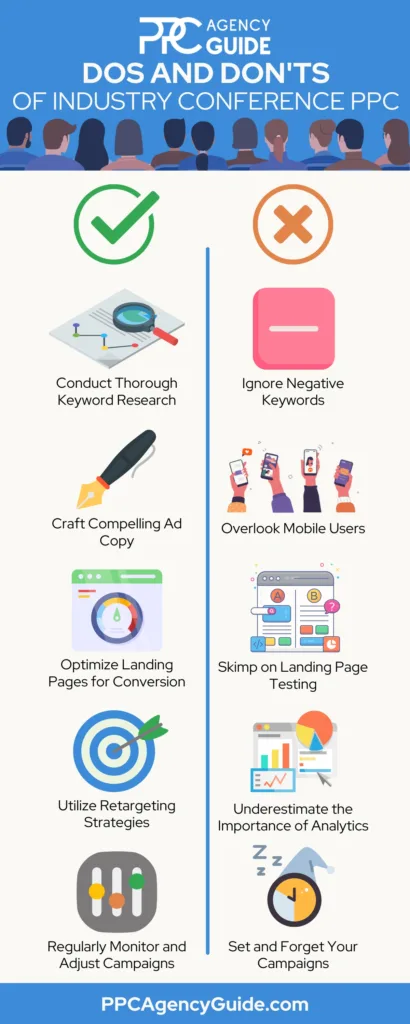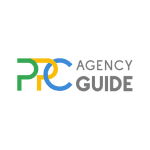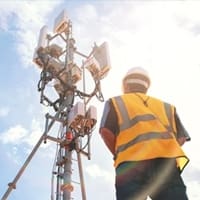
Gone are the days when traditional advertising ruled the conference scene. Now, pay-per-click (PPC) campaigns have taken center stage, offering a direct path to engaging conference attendees and securing a high return on investment. With an ROI of two hundred percent reported by Google, the effectiveness of PPC in the conference circuit cannot be overstated. On this page, we’ll guide you through creating impactful PPC strategies for industry conferences, ensuring your brand captures attention and maximizes its investment.
The Crucial Role of PPC in Conference Marketing
In today’s digital-first world, getting your conference in front of the right eyes requires more than just traditional advertising. PPC advertising is a game-changer for event promotion, offering the precision and flexibility needed to reach your target audience effectively.
The Power of Targeted Advertising
PPC’s real strength lies in its ability to target your advertising efforts.
- Reach Your Desired Audience: Tailor your campaigns to target specific demographics, interests, and even geographic locations, ensuring your conference message reaches those who are most likely to be interested.
- Gain Visibility in Competitive Markets: PPC helps your conference rise above the noise and stand out in the crowded digital space where numerous events and conferences vie for attention.
Immediate Results and Flexibility
PPC allows you to gain instant visibility and the ability to adapt on the fly.
- Quick Launch: Unlike some marketing strategies that require extensive lead times, PPC campaigns can be set up swiftly, making them ideal for promoting conferences with tight timelines.
- Adaptability: PPC campaigns offer unparalleled flexibility, allowing you to tweak your messaging, keywords, and budget allocation based on real-time performance data.
Tracking Success and Adjusting Strategies
PPC helps you understand the impact of your marketing efforts so you can refine and optimize your overall digital marketing.
- Measure Effectiveness: PPC provides detailed analytics that help you measure the success of your campaigns in real-time, from the number of impressions to clicks and conversions.
- Data-Driven Insights: Leverage PPC analytics to make informed decisions about future marketing strategies, ensuring each campaign is more effective than the last.
Crafting Your PPC Campaign for Industry Conferences
Creating an effective PPC campaign involves more than just setting up ads. It requires a strategic approach to ensure your ads reach and resonate with your target audience, driving both awareness and action.
Choosing the Right Channels
Refer to your personas when selecting the best channels for your conference advertising.
- Make the Most of Search: More than half of all internet users search for news and events, HubSpot reports. This means paid search through Google Ads or Microsoft Advertising is a great place to start for most brands.
- Explore Social Media: The average conversion rate for Facebook ads across all industries is 9.21 percent, which makes it the most effective channel, according to WordStream. When it comes to events, conferences can also cash in on the social nature of public RSVPs, which are available on both LinkedIn and Facebook.
Identifying and Targeting the Right Keywords
The success of your PPC campaign starts with choosing the right keywords. These are the terms and phrases your target audience is searching for related to industry conferences.
- Conduct Thorough Research: Use keyword research tools to identify terms your audience uses when looking for conferences in your industry.
- Think Like Your Audience: Consider the types of sessions, topics, or speakers they might be searching for and include these in your keyword strategy.
Designing Compelling Ad Copy
Once you’ve identified your keywords, the next step is to craft ad copy that captures attention and encourages clicks.

- Highlight Benefits: Make sure your ad clearly states what attendees will gain by clicking, whether it’s valuable insights, networking opportunities, or access to exclusive content.
- Use Clear and Action-Oriented Language: Your ad copy should include a clear call to action, encouraging potential attendees to learn more or register.
- Create Urgency: Platforms like Google Ads allow you to dynamically insert data such as countdowns and number of tickets left in your ad text. Leverage these features to boost clicks.
Optimizing Landing Pages for Conversion
The final step in your PPC campaign is to ensure that once potential attendees click on your ad, they’re taken to a landing page that is optimized for conversion.
- Match Your Ad Copy: The message on your landing page should directly align with the ad copy to provide a cohesive user experience.
- Leverage Personalization: Inject locations, names, and more into your landing pages to boost their effectiveness by five percent, as RankTracker reports.
- Simplify the Conversion Process: Make it as easy as possible for visitors to take the next step, whether that’s registering for the conference or signing up for more information.
Measuring Success and Optimizing PPC Campaigns
Once your PPC campaign is live, the next crucial step is to track its performance and make necessary adjustments to ensure optimal results. Understanding how to measure success and continually optimize your campaign is vital to maximizing your investment in PPC for industry conferences.
Setting Clear Objectives and KPIs
Before you launch your campaign, define what success looks like for your specific goals, whether it’s increasing conference registrations, driving traffic to your website, or boosting engagement with your conference content.
- Define Key Performance Indicators (KPIs): These might include click-through rates (CTR), conversion rates, and cost per acquisition (CPA). Setting these KPIs early on gives you a clear benchmark for measuring campaign performance.
- Use Analytics Tools: Platforms like Google Ads and Google Analytics offer comprehensive tools to track your campaign’s progress against your KPIs, providing insights into what’s working and what isn’t.
Analyzing and Refining Your Campaigns
With real-time data at your fingertips, you can start to analyze your campaign’s performance and make informed decisions on how to refine and improve.
- Review Campaign Data Regularly: Look at your campaign analytics frequently to understand how different elements are performing. This includes analyzing keyword effectiveness, ad copy resonance, and landing page conversion rates.
- Test and Improve: Don’t be afraid to experiment. Testing different ad variations, keywords, and landing pages can help you identify the most effective combinations. Use A/B testing to compare results and refine your approach based on concrete data.
Leveraging Retargeting for Increased Engagement
Retargeting is a powerful tool in the PPC arsenal, allowing you to reach individuals who have interacted with your campaign but have not yet converted and making them up to 70 percent more likely to purchase, as HubSpot reports.
- Set Up Retargeting Campaigns: Use retargeting to serve ads to users who visited your landing page but didn’t register for the conference. This keeps your event top-of-mind and encourages them to revisit their decision.
- Customize Your Message: Tailor retargeting ads based on the specific actions users took on your site. For example, if they viewed the conference agenda but didn’t sign up, highlight keynote speakers or sessions of interest in your retargeting ads.
Advanced Strategies for Conference PPC Success
To truly maximize the impact of your PPC campaigns for industry conferences, it’s essential to go beyond the basics and implement advanced strategies that can drive even greater results.
Utilizing Seasonality and Timing
Timing plays a crucial role in the effectiveness of your PPC campaigns, especially when promoting conferences.
- Plan Around Key Dates: Launch your campaigns to coincide with peak interest periods, such as right after major announcements or early bird registration periods.
- Adjust Bids for High-Traffic Times: Increase your bids during times when potential attendees are most likely to be searching for conference information, ensuring your ads receive maximum visibility.
Leveraging Audience Segmentation
The more tailored your messaging, the more effective your campaign will be. Use audience segmentation to deliver personalized ads to different groups.
- Segment by Interest or Behavior: Create different ad groups based on users’ interests, past behavior, or interaction with your site to tailor the messaging that resonates best with each segment.
- Geo-Targeting: For local or regional conferences, use geo-targeting to focus your advertising efforts on audiences within a specific location, maximizing relevance and response rates.
Incorporating Video and Rich Media Ads
Visual content can significantly increase engagement rates. Incorporating video and rich media in your PPC campaigns can capture attention more effectively than traditional text ads.
- Use Video Ads to Tell a Story: Create short, compelling video ads highlighting the benefits of attending your conference, showcasing key speakers, topics, or unique experiences.
- Leverage Rich Media for Interactivity: Implement interactive ads that encourage users to engage directly with your content, such as quizzes or polls related to the conference theme.
Optimizing for Mobile Users
With increasing numbers of users accessing information on their mobile devices, optimizing your PPC campaigns for mobile is non-negotiable.
- Mobile-Friendly Landing Pages: Ensure that your landing pages are responsive and load quickly on mobile devices, providing a seamless experience for users on the go.
- Utilize Mobile-Specific Ad Features: Take advantage of mobile-specific ad features, such as click-to-call buttons or location extensions, to make it easier for mobile users to interact with your ads.
Avoiding Common Pitfalls in Conference PPC Campaigns
Navigating the complexities of PPC campaigns for industry conferences can be challenging, and certain common pitfalls can hinder your campaign’s success. Being aware of these and knowing how to avoid them can significantly improve your campaign’s performance.
Not Defining Clear Goals
Without specific goals, measuring the success of your PPC campaign becomes difficult, leading to wasted resources and missed opportunities.
- Set Specific, Measurable Goals: Clearly define what you want to achieve with your PPC campaign, whether it’s increasing registrations, promoting specific sessions, or boosting overall awareness.
- Align Campaigns with Objectives: Ensure every aspect of your PPC campaign, from keywords to ad copy, is aligned with your goals to maintain focus and direction.
Ignoring the Importance of Landing Page Optimization
A compelling ad is only as effective as the landing page it leads to. Neglecting the optimization of your landing page can result in high bounce rates and lost conversions.
- Ensure Message Match: The messaging on your landing page should closely match the ad to provide a cohesive user experience.
- Optimize for Conversions: Use clear calls to action, concise copy, and engaging visuals to encourage users to take the desired action, such as registering for the conference.
Overlooking Mobile Users
Failing to optimize your PPC campaign for mobile users in today’s mobile-first world can significantly limit its reach and effectiveness.
- Design Mobile-Friendly Ads and Landing Pages: Ensure that all components of your PPC campaign are optimized for mobile devices, offering a seamless experience for users on any device.
- Utilize Mobile-Specific Features: Incorporate features like click-to-call or map directions for local conferences to enhance engagement with mobile users.
Failing to Use Negative Keywords
Negative keywords help prevent your ads from appearing for irrelevant searches, reducing wasted spend and improving campaign relevance.
- Regularly Update Negative Keywords: Analyze search terms that trigger your ads and add irrelevant terms as negative keywords to refine your audience targeting.
- Balance Reach and Relevance: While it’s crucial to avoid irrelevant traffic, ensure you’re not overly restrictive, which could limit your ad’s visibility to potential attendees.
Maximizing Your Conference Impact with PPC
As we’ve explored, pay-per-click (PPC) advertising is an essential tool for amplifying your presence at industry conferences. Through targeted visibility, immediate results, and the ability to measure and optimize in real-time, PPC empowers you to reach your desired audience effectively and maximize your return on investment. By carefully planning your campaigns, choosing the right keywords, crafting compelling ad copy, and optimizing your landing pages, you can ensure that your conference stands out in the competitive digital landscape.
Remember, the key to successful PPC campaign management lies in avoiding common pitfalls—such as unclear goals, neglecting landing page optimization, overlooking mobile users, and failing to use negative keywords. By addressing these areas proactively, you can enhance the performance of your PPC campaigns and achieve your conference marketing objectives.
Take Your Conference Marketing to the Next Level
Maximizing your conference PPC doesn’t have to be a solo journey. With the right PPC strategies and an experienced agency, you can effortlessly elevate your brand’s visibility and engagement. Put your conference PPC strategy on autopilot and work with an experienced agency. To learn more or get started, request a complimentary consultation.



















